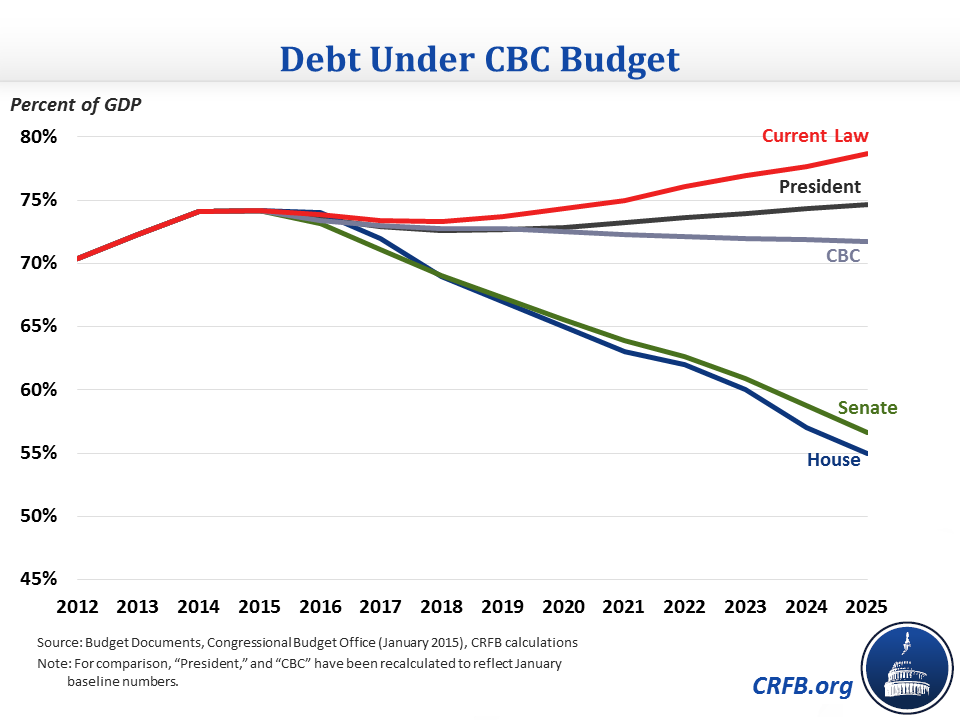Congressional Black Caucus Proposes Alternative Budget
The Congressional Black Caucus (CBC) has released an alternative budget proposal highlighting their policy goals and preferred fiscal path for the coming years. The budget reduces the deficit relative to current law, bringing it to 2.3 percent of Gross Domestic Product (GDP) in 2025. The deficit reduction in the budget would result in a lower debt-to-GDP ratio, which would be just under 72 percent in 2025 - about 7 percentage points of GDP lower than under current law (CBC estimates it to be 68 percent with dynamic effects, or 11 percentage points of GDP lower than under current law). This budget supports many progressive policies focusing on programs intended to reduce poverty, also includes significant tax increases, and is very similar to the Democratic budget and the President's budget.

The budget calls for the House Ways & Means Committee to find $2.7 trillion in revenue increases over the next decade, and it presents $5.6 trillion worth of options for the committee to choose from. These options include all of the President's tax reform proposals as well as limiting corporations' ability to deduct interest on debt from their taxes, taxing capital gains as ordinary income, making the tax code more progressive, and closing the gender wage gap (and therefore increasing taxable income).
The CBC budget would end sequestration for non-defense discretionary spending, but it matches the Van Hollen budget on defense spending - a partial repeal of the defense discretionary sequester and zeroing out war spending after 2016 - and calls for an audit of the Defense Department.
The CBC budget would spend an additional $500 billion on job creation programs over the next three years. Noting that there has been a decline in the unemployment rate generally, they stress that African American unemployment remains exceptionally high at 10.5 percent, nearly twice the national average of 5.5 percent. The increased spending would include $100 billion in a "direct job creation program" administered by the Department of Labor that would directly hire Americans, and the other $400 billion includes funding for modernizing schools, avoiding teacher layoffs, investing in infrastructure, and creating job training programs.
Another important component in the CBC budget is increased funding for social safety net programs. The budget specifies that it would increase spending on social safety net programs above pre-sequester levels, but it does not break down the spending for each individual program. The programs the CBC identifies to increase funding for are Temporary Assistance to Needy Families (TANF), the Supplemental Nutrition Assistance Program (SNAP), and Head Start. The budget also calls for changing the cost-of-living adjustment to Social Security to using CPI-E, a special experimental measure of inflation designed around goods that elderly people are more likely to consume. Additionally, it advocates an increase to the federal minimum wage, but it does not specify the magnitude of this increase.
There are also a number of social reforms proposed in the CBC budget. Citing the Holder v. Shelby County decision that weakened the power of the Voting Rights Act, the CBC budget increases funding for the Department of Justice and calls on Congress to update the Voting Rights Act. The CBC further proposes reforming the prison system, which they predict may save the government $3 billion over the next 10 years by limiting the use of mandatory minimum sentences on non-violent drug crimes. The budget also calls for programs that help to rehabilitate criminals and prevent recidivism, which they hope would further reduce the costs of incarceration. The budget also proposes the creation of a public health insurance option to increase access to health care as well as an increase in the maximum value of a Pell Grant and increased funding to Historically Black Colleges and Universities.
We applaud the CBC for presenting a budget that does put the debt on a downward path in the coming years. You can read about all of this year's budget proposals here.

